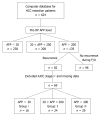Is inconsistency of alpha-fetoprotein level a good prognosticator for hepatocellular carcinoma recurrence?
- PMID: 20572309
- PMCID: PMC2890946
- DOI: 10.3748/wjg.v16.i24.3049
Is inconsistency of alpha-fetoprotein level a good prognosticator for hepatocellular carcinoma recurrence?
Abstract
Aim: To identify the clinical outcomes of hepatocellular carcinoma (HCC) patients with inconsistent alpha-fetoprotein (AFP) levels which were initially high and then low at recurrence.
Methods: We retrospectively included 178 patients who underwent liver resection with high preoperative AFP levels (> or = 200 ng/dL). Sixty-nine HCC patients had recurrence during follow-up and were grouped by their AFP levels at recurrence: group I, AFP < or = 20 ng/dL (n = 16); group II, AFP 20-200 ng/dL (n = 24); and group III, AFP > or = 200 ng/dL (n = 29). Their preoperative clinical characteristics, accumulated recurrence rate, and recurrence-to-death survival rate were compared. Three patients, one in each group, underwent liver resection twice for primary and recurrent HCC. AFP immunohistochemistry of primary and recurrent HCC specimens were examined.
Results: In this study, 23% of patients demonstrated normal AFP levels at HCC recurrence. The AFP levels in these patients were initially high. There were no significant differences in clinical characteristics between the three groups except for the mean recurrence interval (21.8 +/- 14.6, 12.3 +/- 7.7, 8.3 +/- 6.6 mo, respectively, P < 0.001) and survival time (40.2 +/- 19.9, 36.1 +/- 22.4, 21.9 +/- 22.0 mo, respectively, P = 0.013). Tumor size > 5 cm, total bilirubin > 1.2 mg/dL, vessel invasion, Child classification B, group III, and recurrence interval < 12 mo, were risk factors for survival rate. Cox regression analysis was performed and vessel invasion, group III, and recurrence interval were independent risk factors. The recurrence interval was significant longer in group I (P < 0.001). The recurrence-to-death survival rate was significantly better in group II (P = 0.016). AFP staining was strong in the primary HCC specimens and was reduced at recurrence in group I specimens.
Conclusion: Patients in group I with inconsistent AFP levels had a longer recurrence interval and worse recurrence-to-death survival rate than those in group II. This clinical presentation may be caused by a delay in the detection of HCC recurrence.
Figures



References
-
- Chen DS, Sung JL. Serum alphafetoprotein in hepatocellular carcinoma. Cancer. 1977;40:779–783. - PubMed
-
- Peng SY, Lai PL, Chu JS, Lee PH, Tsung PT, Chen DS, Hsu HC. Expression and hypomethylation of alpha-fetoprotein gene in unicentric and multicentric human hepatocellular carcinomas. Hepatology. 1993;17:35–41. - PubMed
-
- Kudo M, Okanoue T. Management of hepatocellular carcinoma in Japan: consensus-based clinical practice manual proposed by the Japan Society of Hepatology. Oncology. 2007;72 Suppl 1:2–15. - PubMed
-
- Bruix J, Sherman M. Management of hepatocellular carcinoma. Hepatology. 2005;42:1208–1236. - PubMed
-
- Peng SY, Chen WJ, Lai PL, Jeng YM, Sheu JC, Hsu HC. High alpha-fetoprotein level correlates with high stage, early recurrence and poor prognosis of hepatocellular carcinoma: significance of hepatitis virus infection, age, p53 and beta-catenin mutations. Int J Cancer. 2004;112:44–50. - PubMed
MeSH terms
Substances
LinkOut - more resources
Full Text Sources
Medical

